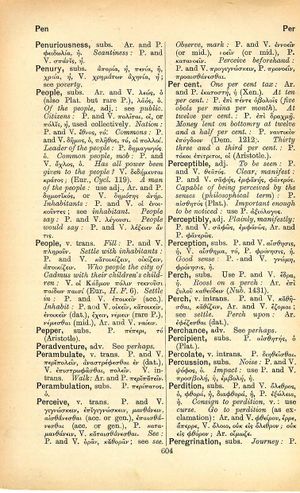people: Difference between revisions
(CSV4) |
m (Woodhouse1 replacement) |
||
| Line 1: | Line 1: | ||
{{Woodhouse1 | {{Woodhouse1 | ||
|Text=[[File:woodhouse_604.jpg|thumb|link={{filepath:woodhouse_604.jpg}}]] | |Text=[[File:woodhouse_604.jpg|thumb|link={{filepath:woodhouse_604.jpg}}]] | ||
Ar. and V. [[λεώς]], ὁ (also | ===substantive=== | ||
[[Aristophanes|Ar.]] and [[verse|V.]] [[λεώς]], ὁ (also [[Plato]] but rare [[prose|P.]]), [[λαός]], ὁ. | |||
of the [[people]], adj.: see [[public]]. | |||
[[citizens]]: [[prose|P.]] and [[verse|V.]] [[πολῖται]], οἱ, or [[πόλις]], ἡ, [[used collectively]]. | |||
[[nation]]: [[prose|P.]] and [[verse|V.]] [[ἔθνος]], τό. | |||
[[commons]]: [[prose|P.]] and [[verse|V.]] [[δῆμος]], ὁ, [[πλῆθος]], τό, [[οἱ πολλοί]]. | |||
[[leader of the people]]: [[prose|P.]] [[δημαγωγός]], ὁ. | |||
[[common people]], [[mob]]: [[prose|P.]] and [[verse|V.]] [[ὄχλος]], ὁ. | |||
[[has all power been given to the people]]? [[verse|V.]] [[δεδήμευται κράτος]]; ([[Euripides|Eur.]], ''[[Cyclops]]'' 119). | |||
[[a man of the people]]: use adj., [[Aristophanes|Ar.]] and [[prose|P.]] [[δημοτικός]], or [[verse|V.]] [[δημότης ἀνήρ]]. | |||
[[inhabitants]]: [[prose|P.]] and [[verse|V.]] [[οἱ ἐνοικοῦντες]]; see [[inhabitant]]. | |||
[[people say]]: [[prose|P.]] and [[verse|V.]] [[λέγουσι]]. | |||
[[people would say]]: [[prose|P.]] and [[verse|V.]] [[λέξειεν ἄν τις]]. | |||
===verb transitive=== | |||
[[fill]]: [[prose|P.]] and [[verse|V.]] [[πληροῦν]]. | |||
[[settle with inhabitants]]: [[prose|P.]] and [[verse|V.]] [[κατοικίζειν]], [[οἰκίζειν]], [[ἀποικίζειν]]. | |||
[[who people the city of Cadmus with their children's children]]: [[verse|V.]] [[οἱ Κάδμου πόλιν τεκνοῦσι παίδων παισί]] ([[Euripides|Eur.]], ''Hercules Furens 6''). | |||
[[settle in]]: [[prose|P.]] and [[verse|V.]] [[ἐποικεῖν]] (acc.). | |||
[[inhabit]]: [[prose|P.]] and [[verse|V.]] [[οἰκεῖν]], [[κατοικεῖν]], [[ἐνοικεῖν]] (dat.), [[ἔχειν]], [[νέμειν]] (rare [[prose|P.]]), [[νέμεσθαι]] (mid.), [[Aristophanes|Ar.]] and [[verse|V.]] [[ναίειν]]. | |||
}} | }} | ||
Revision as of 08:50, 20 May 2020
English > Greek (Woodhouse)
substantive
Ar. and V. λεώς, ὁ (also Plato but rare P.), λαός, ὁ.
of the people, adj.: see public.
citizens: P. and V. πολῖται, οἱ, or πόλις, ἡ, used collectively.
commons: P. and V. δῆμος, ὁ, πλῆθος, τό, οἱ πολλοί.
leader of the people: P. δημαγωγός, ὁ.
common people, mob: P. and V. ὄχλος, ὁ.
has all power been given to the people? V. δεδήμευται κράτος; (Eur., Cyclops 119).
a man of the people: use adj., Ar. and P. δημοτικός, or V. δημότης ἀνήρ.
inhabitants: P. and V. οἱ ἐνοικοῦντες; see inhabitant.
people say: P. and V. λέγουσι.
people would say: P. and V. λέξειεν ἄν τις.
verb transitive
settle with inhabitants: P. and V. κατοικίζειν, οἰκίζειν, ἀποικίζειν.
who people the city of Cadmus with their children's children: V. οἱ Κάδμου πόλιν τεκνοῦσι παίδων παισί (Eur., Hercules Furens 6).
settle in: P. and V. ἐποικεῖν (acc.).
inhabit: P. and V. οἰκεῖν, κατοικεῖν, ἐνοικεῖν (dat.), ἔχειν, νέμειν (rare P.), νέμεσθαι (mid.), Ar. and V. ναίειν.

